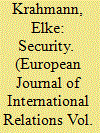| Srl | Item |
| 1 |
ID:
069850


|
|
|
| 2 |
ID:
181166


|
|
|
|
|
| Summary/Abstract |
The global commons – the High Seas, Antarctica, the Atmosphere, and Outer Space – are resource domains outside the authority of states. Historically, the global commons have been practically inaccessible and thus rarely subject to sovereignty claims and international regulations. With technological advances and environmental developments, the global commons have become a key site for international relations (hereinafter IR). In spite of often competing claims from state and non-state actors to these areas, the global commons have remained mainly cooperative. This is not what one would expect from most IR perspectives in a close to anarchical environment and a volatile geopolitical international environment. This Special Issue sets out to address this puzzle by asking: To what extent and why is there little conflict in the global commons? For this purpose, this introduction develops a common framework that distinguishes between three models and corresponding hypotheses of the factors affecting the level of cooperation and conflict in these domains. While two are based on realist and liberal IR perspectives, we draw on constructivism, political theory, and law to develop a third model, called the Human Heritage model. To conclude, this introduction also sums up the findings and discusses their implications for the global commons and IR studies.
|
|
|
|
|
|
|
|
|
|
|
|
|
|
|
|
| 3 |
ID:
083740


|
|
|
|
|
| Publication |
2008.
|
| Summary/Abstract |
The state monopoly on the legitimate use of violence in Europe and North America has been central to the development of security as a collective good. Not only has it institutionalized the state as the prime national and international security provider, it has helped to reduce the threat from other actors by either prohibiting or limiting their use of violence. The recent growth of the private security industry appears to undermine this view. Not only are private security firms proliferating at the national level; private military companies are also taking over an increasing range of military functions in both national defence and international interventions. This article seeks to provide an examination of the theoretical and practical implications of the shift from states to markets in the provision of security. Specifically, it discusses how the conceptualization of security as a commodity rather than a collective good affects the meaning and implementation of security in Western democracies.
|
|
|
|
|
|
|
|
|
|
|
|
|
|
|
|
| 4 |
ID:
157716


|
|
|
|
|
| Summary/Abstract |
The paper delineates three debates, which will be conflated. One line of discussion relates to public goods at a transnational level. Here, the referencing of debates regarding the characteristics of ‘a common good’ will be of significance. A second strand addresses the group of countries known as the ‘rising powers’ and the role these countries could play towards a globalised common good. A third discussion thread analyses South Africa as a case study for the main rising power on the African continent. By creating connections between the lines of discussion, this paper drives forward the debates on how the role of rising powers can be conceptually repositioned in the light of a changing global context, and explores how these countries can respond to global challenges.
|
|
|
|
|
|
|
|
|
|
|
|
|
|
|
|